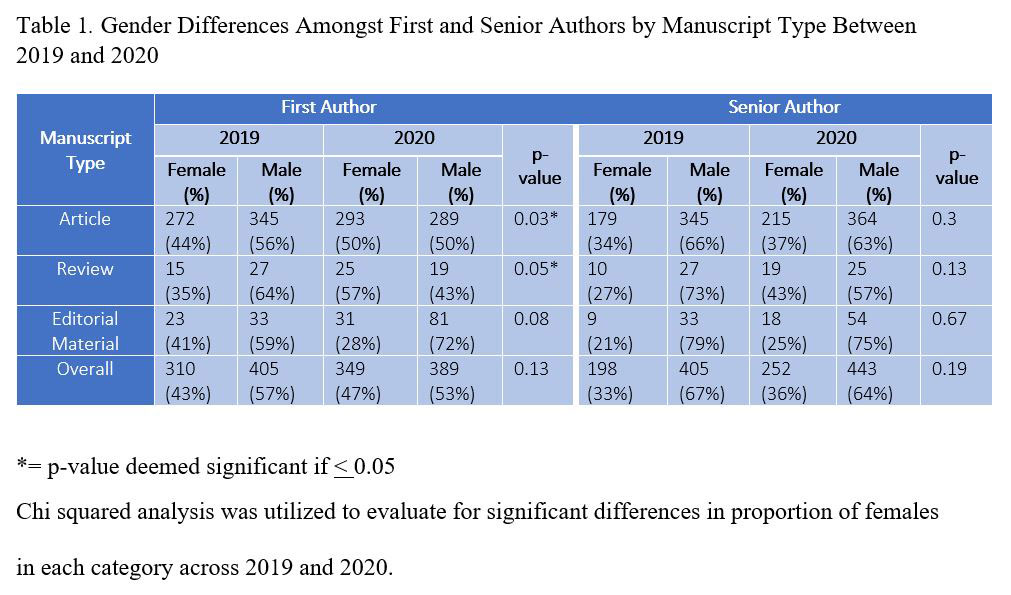Session Information
Session Type: Poster Session B
Session Time: 9:00AM-10:30AM
Background/Purpose: Recent data suggests the COVID-19 pandemic disproportionately affected productivity of women in the workforce. This bibliometric analysis examines gender differences in authorship of manuscripts in select rheumatology journals prior to coronavirus 2019 (COVID-19) and during the early pandemic.
Methods: All manuscripts in the categories of article, review, or editorial that were published between March 1, 2019 to March 1, 2021 in 3 high‐impact rheumatology journals (Annals of the Rheumatic Diseases, Arthritis and Rheumatology, and Arthritis Care and Research) were identified using Web of Science. Authors’ genders were determined by matching first name with predicted gender using a validated multinational database (Genderize.io) and manual review of any names with less than 90% probability. The names that could not be clarified (n = 41) were excluded from further analysis. Data analysis identified the number of women and men who were first authors and senior authors, the types of manuscripts and whether the articles were related to COVID-19.
A total of 1,417 manuscripts were identified and 1,377 were analyzed and grouped by earliest date of publication from 3/1/2019 to 3/1/2020 (labeled as 2019) or 3/2/2020 to 3/1/2021 (labeled as 2020). Proportions were compared using χ2 analysis.
Results: In 2019, women were first authors of 311 manuscripts and senior authors of 198. In 2020, women were first authors of 349 manuscripts and senior authors of 252. Females represented 48% (660 of 1377) of all first authors and 34.6% (450 of 1301) of senior authors across both years. Females were 48.7% and 47.2% of first authors from 2019 and 2020, respectively. In evaluating senior authors, 32.6% and 36.3% were female in 2019 and 2020, respectively (Table 1). Women’s authorship significantly increased from 2019 to 2020 as first authors of articles and reviews (p = 0.03 and 0.05 respectively). Of the manuscripts related to COVID-19 (n=43), women were first authors of 46.5% and senior authors of 28%, with no significant difference between genders (p = 0.11).
Conclusion: This analysis explored female authorship in high impact rheumatology journals in the time before and during the COVID-19 pandemic. Females accounted for 47.8% of all first authors and demonstrated significant increase in first authorship, notably in articles and reviews, but also with an overall increasing trend. This demonstrates an improving gender equity amongst first authors. Albeit a small sample (n=42), there was no significant difference between genders in authorship related to COVID-19 (p =0.11). A very notable finding was that only about a third of senior authors were female overall, and this did not significantly change across the two years (p = 0.19), with 33% and 36% of senior authors identified as female in 2019 and 2020, respectively. Based on this snapshot in time surrounding the COVID-19 pandemic, there is undoubtedly room for improvement with senior authorship. However, it is encouraging to see that there is growth in female authorship in major rheumatology journals, rather than a decrease in authorship that some anticipated during this pandemic.
To cite this abstract in AMA style:
Chaurasia N, Iyer P, Esmaeili-Ghahfarokhi M. Gender Differences in Rheumatology Authorship: A Bibliometric Analysis of High Impact Rheumatology Journals from 2019-2021 [abstract]. Arthritis Rheumatol. 2022; 74 (suppl 9). https://acrabstracts.org/abstract/gender-differences-in-rheumatology-authorship-a-bibliometric-analysis-of-high-impact-rheumatology-journals-from-2019-2021/. Accessed .« Back to ACR Convergence 2022
ACR Meeting Abstracts - https://acrabstracts.org/abstract/gender-differences-in-rheumatology-authorship-a-bibliometric-analysis-of-high-impact-rheumatology-journals-from-2019-2021/

